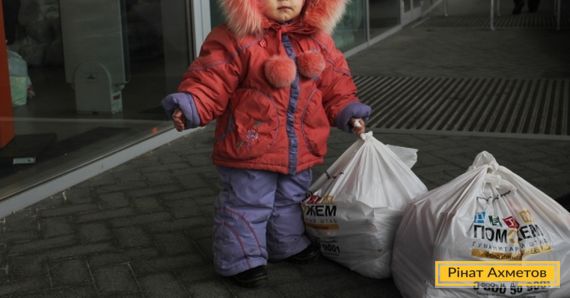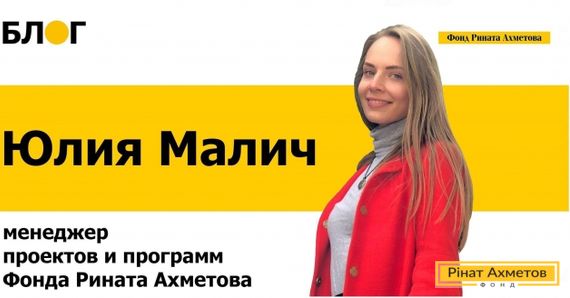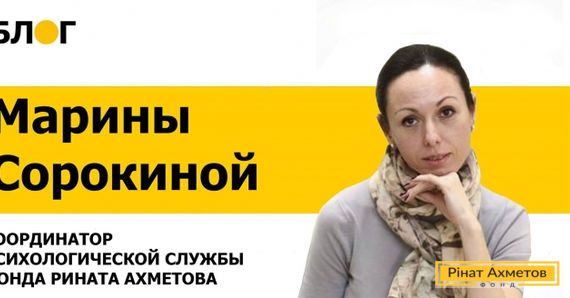Our second million. Blog of Natalia Yemchenko, Director of Public Relations and Communications of SCM, for LB.UA

During all this period we were screaming about the extremely difficult situation that occurred to Donetsk civilians, about requirement in humanitarian aid and the obstacles to overcome. The situation was getting worse every day and obstacles never decreased. They were increasing.
Over 5 months of our work on humanitarian aid delivery, from August 22, 2014 till February 28, 2015, Rinat Akhmetov's Humanitarian Center issued over 2 million food packages to the peaceful residents of Donetsk and Luhansk regions and IDPs. These are 25 ths. tonnes of aid that required 2 258 trucks to deliver it; and more than 2 500 people were involved in its distribution. These are employees of the Humanitarian Center, SCM Group assets, Shakhtar Football Club and volunteers. With their assistance peaceful residents from 57 towns and settlements got all the necessary food products.
During all this period we were screaming about the extremely difficult situation that occurred to Donetsk civilians, about requirement in humanitarian aid and the obstacles to overcome. The situation was getting worse every day and obstacles never decreased. They were increasing.
In August 2014 we started delivering food to IDP camps. First we started delivering food for those people, whom we transported to the camps. Then we proceeded with helping other IDP camps. Our trucks were not allowed to the conflict area, where the situation was especially difficult. Volunteers were delivering food from the transshipment bases on the territory, controlled by Ukrainian government, to the conflict areas. And we were tracking information with bated breath: whether they pass or will be blocked, got under the shelling or avoid it, deliver aid or not. And it lasted till the end of September.
After the first heavy trucks started for Donetsk, and geography of assistance exceeded two dozens of towns and districts, we faced the following goal: organize simple and effective system for purchasing, delivery, dispatch, stickering, packaging and distribution of large-scale humanitarian aid. It shall be organized by the Humanitarian Center and with participation of volunteers from SCM Group enterprises and Shakhtar Football Club. Every day 750 volunteers work at Donbas Arena and 500 volunteers work in Mariupol. By their forces each of 34 million (!) unit of goods were stickered with "Humanitarian aid. Not for sale" label.
The following important goal was determination of real necessity in humanitarian aid by Donbas civilians. So that assistance is provided to those, who especially need it. And those, who need in more than the others. For this matter we attracted volunteers and sociologists from Kyiv International Institute of Sociology, created a map of requirements in humanitarian aid and presented it to all the interested parties: international and Ukrainian state and non-governmental organizations, volunteers and mass media.
But delivery of these two millions was a goal that looked like obstacle race. Each of the hundreds of volunteers and charity providers, who delivered loads through the contact line, knows that humanitarian aid is delivered there not "owing to", but "in spite of".
Security. First, we couldn't reach an agreement in organization of safe humanitarian corridors, safe load transportation and security of volunteers and aid receivers. In other words, we couldn't reach an agreement in simple humanitarian rules, adopted in the international society.
Acknowledgement of humanitarian disaster. Second, despite the fact that Humanitarian Center started providing operative and detailed information on its activity, we face a real information blockade in mass media. There was the following paradoxical situation: Ukrainian mass media were continuously talking about Russian humanitarian aid convoys and at the same time they turned away from the information on humanitarian disaster and assistance that was coming from Ukrainian organizations, volunteers and international organizations. The only exception was a video on the Internet that flew around Ukraine and practically the whole world, where a young girl escapes falling glass from the Western side of Donbas Arena during shelling.
Politicization of humanitarian aid. A direct consequence of the wide-spread information blockade is politicization of humanitarian assistance and loud accusations of Humanitarian Center from all sides. In Donetsk and Luhansk they accuse us in taking food out of Donbas Arena and feeding Ukrainian army and volunteer battalions at the expense of starving Donbas residents. At the same time, representatives of Ukrainian volunteer battalions started accusing us in feeding the armed subdivisions of Donetsk and Luhansk People's Republics and providing them with vodka, cigarettes and special military clothing, which is totally groundless. As a result of these accusations, the trucks with humanitarian aid couldn't reach the most vulnerable people, who need food, medications and goods for children, more than a week; instead they started calling for exchange of military prisoners for the blocked humanitarian trucks.
To stop politicization of humanitarian aid we offered that humanitarian aid trucks are inspected with participation of representatives from the international organizations, government authorities, mass media and volunteer battalions, and announced again that Rinat Akhmetov's Humanitarian Center helps only the most vulnerable peaceful residents across the whole territory of Donbas. And to be able to do it with no obstacles, we made a consent decision - to refuse from helping the armed people on both sides.
Access of humanitarian loads over the contact line. The following set of problems that we faced are due to the new order of crossing the ATO area borders, introduced in January 2015, as well as new rules for humanitarian aid registrations, accompanied by bureaucratic mess. As a result, dozens of trucks with humanitarian aid from Rinat Akhmetov's Humanitarian Center, UNO and Red Cross were forced to stay at the checkpoints, and the representatives of the Ministry of Social Policy, responsible for the issuance of new documents, found out about this ... only after our appeals. During the All-Ukrainian Forum of Charity providers, which took place last week, almost all the representatives of Ukrainian and international organizations talked about maximal simplification of humanitarian aid access to the people, who need it. State representatives promised to solve the problems with permits for civilians and humanitarian aid trucks.
Single Register for aid recipients. Another problem, which also has been in the centre of attention at the Forum, is the lack of single information base, lack of coordination between different organizations that provide humanitarian aid. Without such base the following situations may occur: humanitarian aid will be provided to the same people, but the most vulnerable people, who are staying in hospitals or psychoneurologic dispensaries, will be actually starving to death. This problem must be solved as soon as possible, before the activation of international organizations in April-May 2015, and increase of humanitarian aid volumes.
I described the details of the key problems that we faced during five months of Humanitarian Center's work not to complain, praise myself or find the guilty people. What's more important is that we fix these problems, turn them into tasks and solve them by joint efforts. I am strongly convinced that providing humanitarian aid shall have no obstacles. Because each of the obstacles results in delay of aid to those people, who really need it.




